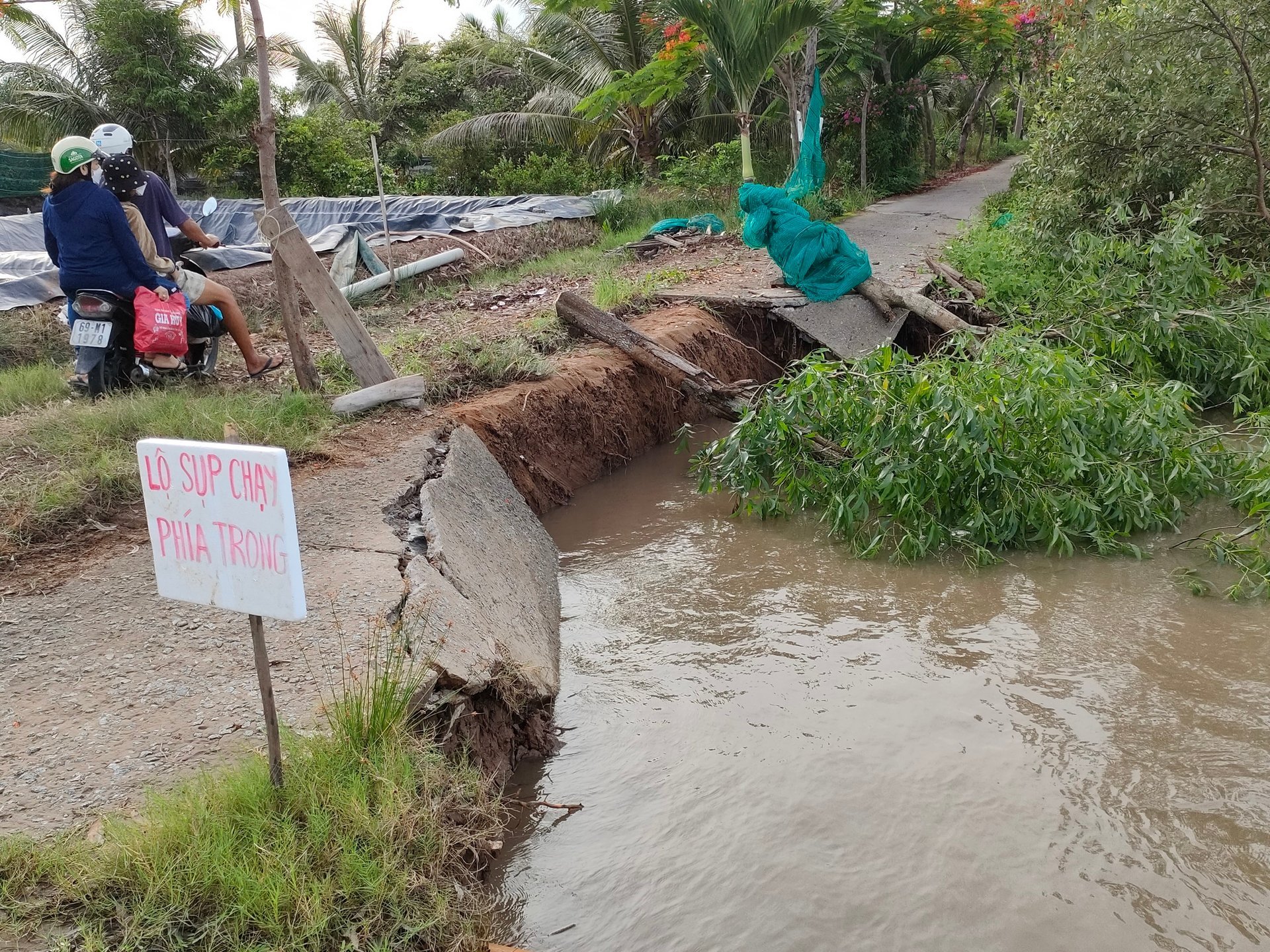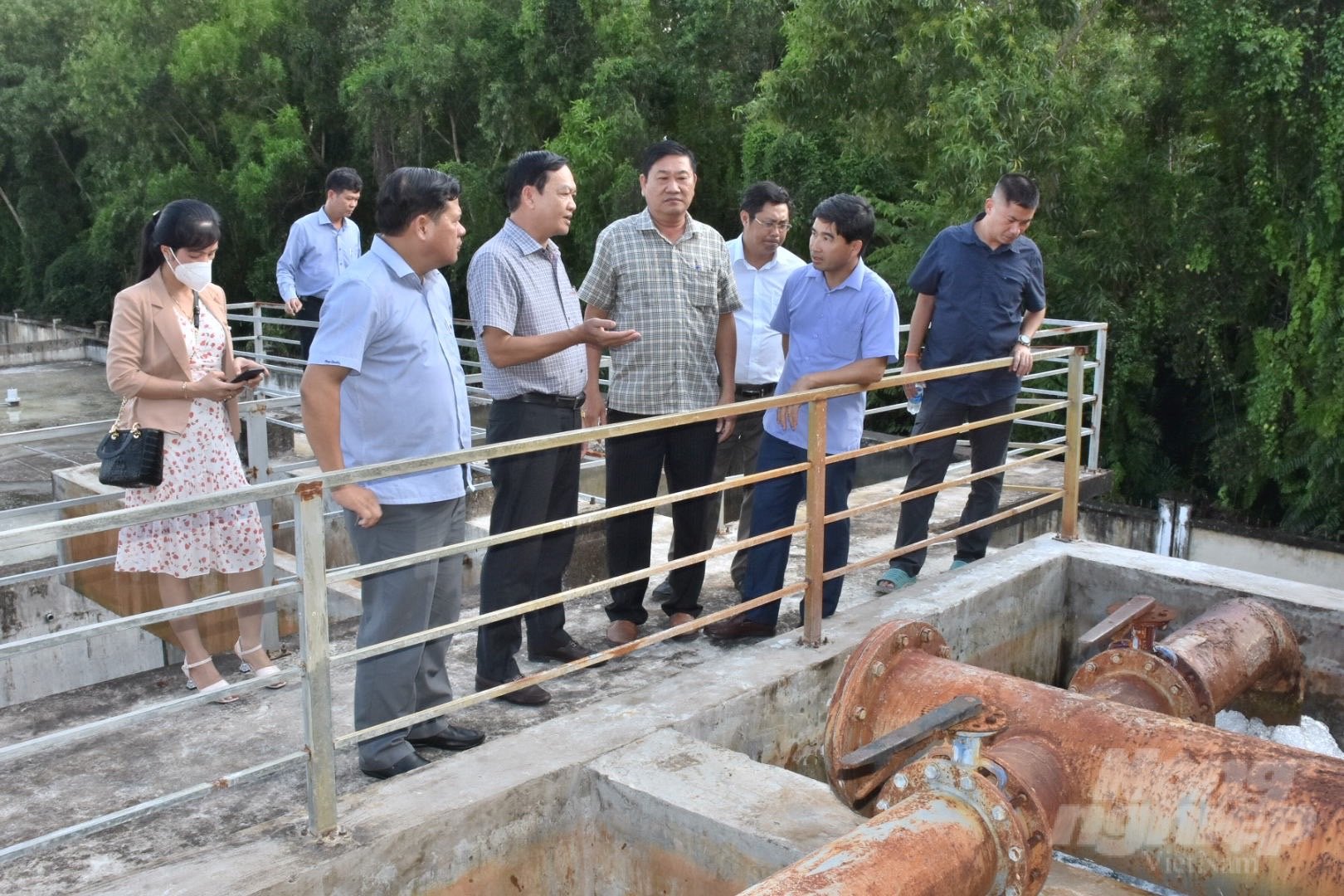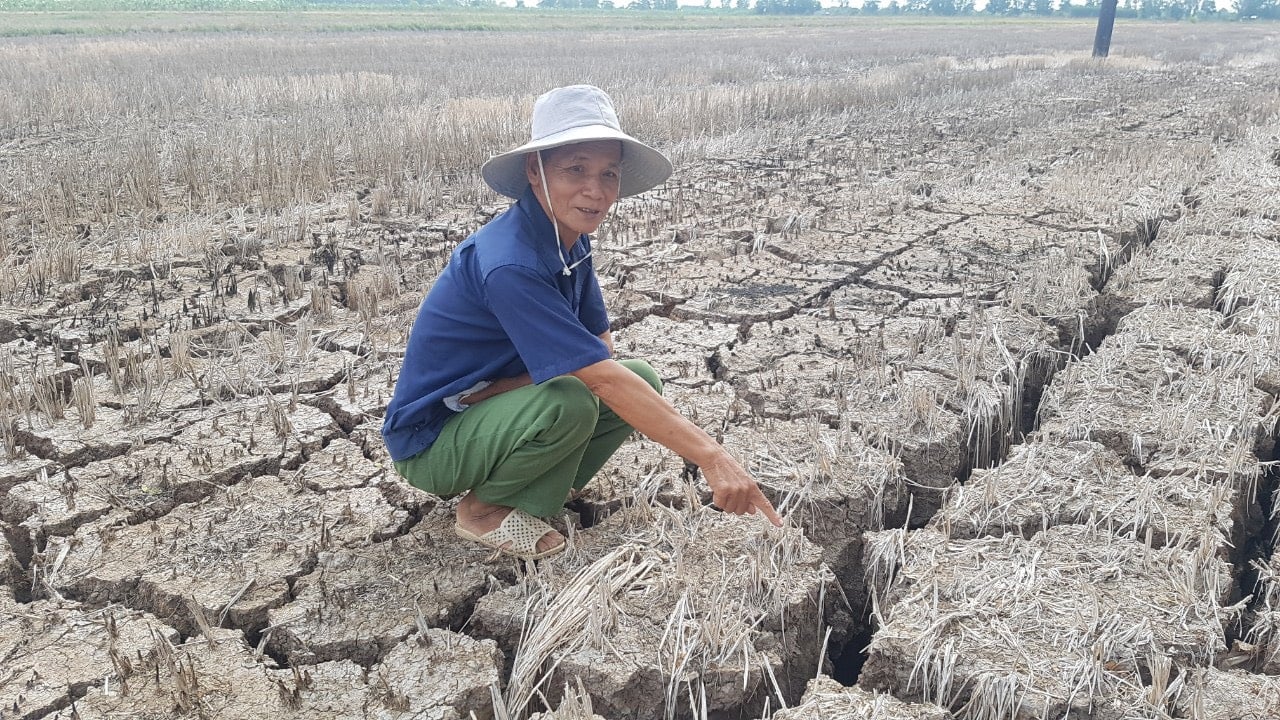May 30, 2025 | 00:15 GMT +7
May 30, 2025 | 00:15 GMT +7
Hotline: 0913.378.918
May 30, 2025 | 00:15 GMT +7
Hotline: 0913.378.918
According to the Department of Water Resources under the Ministry of Agriculture and Rural Development, due to the effects of climate change and increased water usage by upstream countries, the freshwater sources in the Mekong Delta region are experiencing a steady decline in both quantity and quality.
The entire Mekong Delta region currently supports nearly 4,000 concentrated rural water supply projects. Additionally, approximately 2,450 projects, or 62%of them, are operating sustainably. This region has a high rate of sustainable water supply projects compared to the national average.
Provinces like Tra Vinh, An Giang, Hau Giang, Soc Trang, and Bac Lieu have a high number of sustainable projects, ranging from 70% to 100%. About 1,350 projects (35%) are considered relatively sustainable. Among them, provinces like Ca Mau, Dong Thap, Ben Tre, and Long An have a relatively high number of sustainable projects, ranging from 40% to 50%. Approximately 110 projects (2.5%) are considered less sustainable.

Land subsidence in the Mekong Delta region has grown increasingly severe in the last few years. Photo: Trong Linh.
As observed, the current price of freshwater in the Mekong Delta region does not correspond to the production cost. It ranges from a minimum of 2,000 - 3,000 VND in the provinces of Long An and Vinh Long to a maximum of 11,000 - 12,000 VND in the provinces of An Giang, Soc Trang, and Tra Vinh. The majority of provinces have not implemented policies to support water prices for facilities with prices lower than the regulations. On the other hand, several provinces face difficulties in managing and operating facilities due to their limited surface water resources, high raw water prices, low water usage by the population.
Additionally, the issue of land subsidence in the Mekong Delta region is rapidly developing, with the primary cause being the excessive exploitation of groundwater. Most notably, the land subsidence level ranges from 0.5 to 3 centimeters every year, whereas the annual sea-level rise is approximately 0.3 cm, leading to unmanaged flooding and pollution.
According to Mr. Le Tiep Can, Deputy Chairman of the Bac Lieu Provincial People's Committee, the province is operating 115 effective centralized rural water supply systems. The proportion of rural residents using water for sanitation purposes is 99.9%, and the proportion of rural residents using nationally standardized clean water is nearly 73.3%. Furthermore, the entire province has all of its 49 communes meeting the criteria for clean water in the New Rural Area Program.

The Department of Water Resources inspecting the domestic water source in Phuoc Long district, Bac Lieu province. Photo: Trong Linh.
With the goal of ensuring the quality of clean water targets in the construction of the Rural Clean Water and Environmental Sanitation Program, the province proposed the Government and the Ministry of Agriculture and Rural Development to support Bac Lieu in implementing an additional 22 concentrated rural water supply projects. The province also requested assistance in building a pilot model for collecting and treating rural wastewater under the Program for Strengthening Environmental Protection, Food Safety, and Rural Clean Water Supply in the process of new rural area construction from 2021 to 2025.
According to the Department of Water Resources, due to the impact of climate change and the increased water usage by upstream countries, the freshwater sources in the Mekong Delta are experiencing a decline in both quantity and quality. As a result, there is an increasing risk of freshwater shortage for domestic use during the dry season, particularly in coastal areas. Prolonged droughts and saltwater intrusion have penetrated deep into the mainland. During the extended drought and saltwater intrusion events in 2015-2016 and 2019-2020, which lasted nearly five months, around 200 centralized water supply projects were affected, leading to a shortage of domestic water for nearly 100,000 households.

The dry season has exhibited marked severity in recent years within the Mekong Delta region. Photo: Trong Linh.
Mr. To Quoc Nam, Deputy Director of Ca Mau province's Department of Agriculture and Rural Development, stated that Ca Mau, being one of the downstream provinces, faces considerable challenges regarding surface water supply, often necessitating the extraction of groundwater. However, not all areas within the province can gain access to groundwater. During the rainy season, these areas must rely on rainfall, but during the dry season, some canals become so dry that children can play football on their beds.
A representative from Tra Vinh province has mentioned that water supply investments primarily focus on major national or provincial highways. However, the process of installing water pipelines is complex and costly. Within the provincial jurisdiction, the approval process will only take three days. However, if it involves national highways, the process may take up to three months.
Additionally, in Vinh Long province's view, the criteria for the New Rural Area program, which require an assessment of surface water, are challenging to meet. Due to the unique characteristics of the Mekong Delta, where water levels vary significantly from morning to noon, it is difficult to conduct accurate assessments. The province suggests the Ministry of Agriculture and Rural Development to amend or eliminate this criterion.
Furthermore, the lack of suitable locations for the installation of water pipelines across national highways poses challenges. Due to the complex river network in the Mekong Delta, the construction of additional bridges would be prohibitively expensive for many provinces and cities.
Deputy Minister Tran Thanh Nam has presented several observations and solutions on the matter. Regarding the planning of the Mekong Delta region, there are concerns regarding the construction of excessively large reservoirs. However, considering the geographical location and characteristics of the Mekong Delta, with its weak soil foundation and land subsidence issues, constructing large reservoirs would necessitate frequent reinforcement and significant investments in the water transmission systems, and the agricultural land continues to shrink.
Deputy Minister Nam suggests the creation of community-based water storage models for individual households and residential clusters, utilizing existing resources such as ponds and lakes. He emphasizes the need to invest in water treatment technologies to ensure water quality. This long-term approach aims to secure a sustainable water source for the daily lives of the people in Western Vietnam.
He also highlights the consequences of excessive groundwater extraction, including land subsidence and increased saltwater intrusion. To address these challenges, Deputy Minister Nam recommends considering the utilization of water pipelines, which is similar to the North-South highway, to transport water from upstream regions.
Deputy Minister Nam calls on the provinces and cities in the Mekong Delta to prioritize local budget allocation in collaboration with central government budgets and ODA funds for water supply infrastructure in water-scarce and vulnerable areas affected by drought, saltwater intrusion, water pollution, coastal areas, border regions, and islands.
Priority should be given to allocating resources for the upgrade and repair of centralized water supply facilities to meet both the quantity and quality requirements for rural clean water. Regular funding should be allocated for the maintenance of the monitoring and evaluation system for rural clean water. The implementation of medium-term water supply infrastructure investment projects between the years 2021 and 2025 should be expedited, ensuring adherence to schedules and project objectives.
The Mekong Delta is situated downstream and is susceptible to saltwater intrusion. As groundwater usage predominates, this geographical location significantly impacts the region's future. The Mekong Delta's population currently exceeds 17 million people, with approximately 5 million people experiencing a shortage of domestic water, which may increase exponentially by 2030.
Translated by Nguyen Hai Long

(VAN) Ms. Nguyen Thi Dung, Deputy Director of Ngoc Hoang Cooperative, shared about the journey of bringing dragon fruit to Europe, achieving annual revenues in the billions of VND.

(VAN) Bamboo products from Thang Tho Bamboo Cooperative have reached many countries around the world, while also creating jobs for local workers.

(VAN) The Management Board of Con Dao National Park reported that a green sea turtle, tagged in the Philippines, has traveled thousands of kilometers to lay 84 eggs on Bay Canh Islet.

(VAN) Green technology is paving a new path for sustainable aquaculture in the Mekong Delta in particular and across the country in general, helping reduce emissions and adapt to climate change.

(VAN) On May 27, La French Tech Vietnam (the French startup and innovation community in Vietnam) held the French Tech Summit Vietnam 2025.
/2025/05/27/4731-2-223159_980.jpg)
(VAN) No votive paper, no styrofoam, no plastic bags, no plastic bottles, and no single-use plastic trays are the key rules tourists should keep in mind when visiting Con Dao.

(VAN) In the fight against plastic pollution, Vietnam has been demonstrating a proactive, pioneering, and active role in addressing the greatest environmental challenge today.